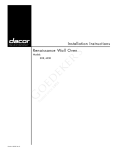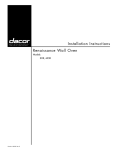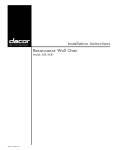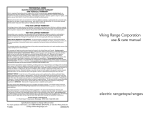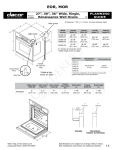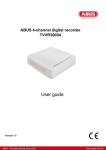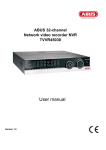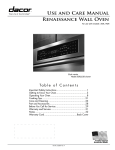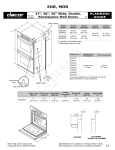Download Dacor MCS/D Specifications
Transcript
Renaissance Wall Oven Service Guide Models: EORS127, EORS130, EORS227, EORS230, EORD227, EORD230, MORS127, MORS130, MORS227, MORS230, MORD227, MORD230 The Life of the Kitchen. ® Part No. 106075 Rev. A ® Specifications subject to change without notice. Dacor assumes no liability for changes to specifications © 2008 Dacor, all rights reserved Dacor Technical Assistance: (800) 353-2267 Table of Contents Table of Contents . Section 1 - Important Safety Instructions .................................. 1 Section 2 - General Information .................................................. 3 Contacting Dacor for Assistance ...................................... 3 Model and Serial Number................................................ 3 Finding the Appliance Data Plate.............................. 3 Reading the Serial Number ...................................... 3 Model Number Identification.................................... 4 Section 3 – Quick Diagnostic Test ............................................... 5 Renaissance Wall Oven Quick ERC/Diagnostic Test ... 5 Test for Upper and Single Ovens............................ 5 Test for Lower Double Ovens................................. 6 Section 4 – Troubleshooting Charts ............................................ 7 Voltage and Continuity ................................................... 7 Membrane Continuity Test ............................................ 13 Section 5 – EOR-MOR Wall Oven Error Codes ........................... 14 Section 6 – Temperature Offset Calibration Instructions ......... 16 Entering Calibration Mode............................................. 16 Calibrating Additional Modes ......................................... 16 Section 7 – Wiring Diagrams ..................................................... 17 v Dacor Renaissance Wall Oven Service Guide This page intentionally left blank. vi Section 1 - Important Safety Instructions Section 1 - Important Safety Instructions WARNING: f Operate this appliance only as specified in this manual or the use and care manual. f Only a qualified installer should install this appliance. f Other than performing procedures specified in the Wall Oven Use and Care Manual, only a qualified service technician should service this appliance. To obtain the name of your closest Dacor service representative, call (800) 793-0093. A list of service representatives is also available at www.dacor.com. f Before attempting to service or connect this appliance to electrical power, turn off the electrical power supply. Failure to disconnect the power supply during installation or service may result in electrical shock or fire hazard. f This appliance must be properly grounded whenever electrical power is applied. f This appliance must be connected to a grounded, metallic, permanent wiring system. The grounding connectors must be connected to the grounding terminal or lead on the appliance. Failure to do so may result in an electrical shock hazard. f Do not ground this appliance to a gas supply pipe or hot water pipe. f A ground connection to a cold water pipe must have a metal continuity to electrical ground and must not be interrupted by insulating materials. Any insulating materials must be jumped as shown in the installation instructions. f Use only connectors specially designed and certified for joining copper and aluminum to splice the appliance copper wire to the aluminum house wiring. f Do not install a fuse in the neutral or ground circuit during installation. A fuse in the neutral or ground circuit may result in an electrical shock hazard. f Do not install this appliance if the electrical service provided does not meet the product specifications on the model and serial number plate (see page 3). The electrical service must be installed or changed only by a licensed electrician. f Do not operate this appliance if it has a damaged electrical cord. f Failure to install the mounting screws may result in movement or tipping of the oven during use and may result in personal injury. f Use an appliance dolly to move the appliance or when installing it or removing it from the wall for service. Use of an appliance dolly will minimize the risk of personal injury as a result of the oven tipping. f Use the oven only for cooking tasks expected of a home appliance as outlined in this manual. Do not use corrosive chemicals or vapors in this appliance. This type of oven is specifically designed to heat food. It is not designed for industrial or laboratory use. f Do not touch the interior surfaces of the oven during or immediately after use. Do not allow clothing or other flammable materials to contact interior surfaces of the oven until they have had sufficient time to cool. f Exercise caution when opening the oven door. Let hot air or steam escape before looking or reaching into the oven. f Do not store combustible, flammable, or explosive materials in the oven or in adjacent cabinets. f Do not attempt to disengage the oven door’s hinge locks with the door removed from the oven. The hinge springs could release and cause personal injury. f Do not lift or carry the oven door by the door handle. Page 1 Dacor Renaissance Wall Oven Service Guide WARNING: f Do not line the oven with aluminum foil or other materials. These items can melt or burn up during selfcleaning and cause permanent damage to the oven. f Do not use a steam cleaner to clean the oven. Steam could penetrate electrical components and cause a short circuit. f Do not leave metal objects, such as aluminum foil, the meat probe, or cookie sheets, on the floor of the oven. Objects left on the bottom of the oven could trap heat in the bottom, damaging the bake element. In addition, the objects themselves could be damaged. f Do not air intakes or exhaust slots, anywhere on the oven to become obstructed at any time. Do not operate the oven if the exhaust deflector below the oven door is bent. f The oven automatically locks the oven door during self-cleaning. Do not try to force the door open after it is locked. Damage to the door and the door latch may result. f Before self-cleaning the oven, remove the broiler pan grill and pan, oven racks, convection filter, meat probe, and any other utensils. f Use only the cleaning solutions specified in the use and care manual to clean the inside or outside of the oven. Other cleaning solutions could produce hazardous fumes, cause corrosion of the metal parts, and could permanently damage the finishes. Clean only those parts listed in the use and care manual. f Take extreme caution when handling the door gasket. Damaging the door gasket in any way may eliminate the required tight door seal. Clean the gasket only as specified in the use and care manual. f Use of meat probes other than the one provided with the oven may result in damage to the meat probe and/or the oven. Page 2 Section 2 - General Information Section 2 - General Information Contacting Dacor for Assistance For assistance with installing or servicing Dacor appliances: Phone: 1-800-353-2267 1440 Bridge Gate Drive Diamond Bar, CA 91765 Model and Serial Number Finding the Appliance Data Plate: It can be seen through the grill located below the control panel. Open the door to expose the grill. On double ovens, the plate is located behind the top grill. Reading the Serial Number X-XX-05310026 Product Code (V = WALL OVEN) Unit number Revision Week of Manufacture Year of Manufacture Page 3 Dacor Renaissance Wall Oven Service Guide Model Number Identification EORS30xxx Model Type Epicure Renaissance Oven Millennia Renaissance Oven = EOR = MOR Configuration Single Oven Double Oven =S =D Width 27 Inch 30 Inch = 27 = 30 Trim Finish Options Epicure: Stainless Steel, Chrome Trim Black Handle, Black Trim Black Handle, Stainless Trim = SCH =B = BK Millennia: Stainless Steel =S Page 4 Section 3 – Quick Diagnostic Test Section 3 – Quick Diagnostic Test Renaissance Wall Oven Quick ERC/Diagnostic Test Test for Upper and Single Ovens Test 1 Test Description Oven lights 2 3 Membrane keypad check Controller numeric keys 4 Cooling fan function 5 Bake element 6 Broil element 7 Convection element and convection fan 8 Door latch motor engaged 9 Door latch motor disengaged 10 Meat probe operation 11 Lock out 12 12/24 HR clock mode 13 12/24 HR cook mode 14 15 UPO settings C/F setting Requirement Press LIGHT 2 or more times and observe that light turns On and Off. Push each individual key and verify audible beep. Press CLOCK and press each number key. The number on the key pressed will appear on the display. Press #, BAKE and then press down key 10 times and then START. This will put the unit in Sabbath mode with target temperature of 100 deg F. Verify that cooling fan is operational. Press CONV ROAST, 2, 0, 0, START. When the bake element is on, measure amperage. (Approx. 10-12) amps are drawn. Press BROIL, 2, 0, 0, START. When the broil element is ON, measure amperage. (Approx.13-14) amps are drawn. Press PURE CONV, 2, 0, 0, START. When the convection element is ON, measure. (Approx. 9-10) amps are drawn. Verify operation of convection fan. If OK, press CANCEL - SECURE key. Close oven door and press SELF CLEAN, START. Check door is locked once lock icon comes on solid on display and element start cycling. Press CANCEL - SECURE to cancel SELF CLEAN. Check door is unlocked once lock icon disappears from display. Insert meat probe connector and place meat probe on top of bake element. Press BAKE, PROBE, START. Verify PRB icon lit on display and the temperature value reaches a value of 90 degrees F or more. Press and hold CANCEL-SECURE key for 5 seconds. Verify membrane is locked out. Press and hold CANCEL-SECURE key again for 5 seconds. Verify membrane operational. Press CLOCK key for 6 seconds until either "12HR" or "24HR" shows on the display. Press # button to toggle between 12HR & 24HR. Press TIMER 1 key for 6 seconds until the display shows "ON" or "OFF" . Toggle between "ON" and "OFF" and then set to "ON". Press # button to toggle between 12HR and 24HR. Press TIMER 2 key for 6 seconds and until the display shows "ON" or "OFF”. Toggle between "ON" and "OFF" and then set to "ON". Press # button to toggle between 12HR and 24HR. Press BAKE key for 5 seconds. Set to 00. Press BROIL key for 5 seconds. Verify that it is set to "F". If not, press # key to toggle between "C" and "F". Continued… Page 5 Dacor Renaissance Wall Oven Service Guide Test for Lower Double Ovens Test 16 Test Description Cooling fan function 17 Bake element 18 Broil element 19 Convection element and convection fan 20 Door latch motor engaged 21 Door latch motor disengaged 22 RTD Test Page 6 Requirement Press #, BAKE for lower oven and then press the down key 10 times, then START. Unit will go into Sabbath mode with target temperature of 100 deg F. Check that cooling Fan is ON. Press CONV ROAST (for lower oven), 2, 0, 0, START. When the bake element is on, measure amperage. (Approx. 10-12) amps are drawn. Press BROIL (for lower oven), 2, 0, 0, START. When the broil element is ON, measure amperage. (Approx.13-14) amps are drawn. Press PURE CONV (for lower oven), 2, 0, 0, START. When the convection element is ON, measure. (Approx. 9-10) amps are drawn. Verify operation of convection fan. If OK, press CANCEL - SECURE key. Close lower oven door and press SELF CLEAN key for lower oven, then START. Check door is locked once lock icon comes on solid on display and element start cycling. Press CANCEL - SECURE to cancel SELF CLEAN. Check lower door is unlocked once lock icon disappears from display. Insert meat probe connector and place meat probe on top of bake element. Press BAKE (for lower oven), PROBE, then START. Verify PRB icon lit on display and the temperature value reaches a value of 90 degrees F or more. Section 4 – Troubleshooting Charts Section 4 – Troubleshooting Charts Voltage and Continuity Symptoms All the voltage test points will be at the relay board. No clock display While power is on check the following Voltages: 1) P3 pin 4 - P3 pin 5 = 5 VDC (check both relay and display board). 2) P3 pin 6 - P3 pin 7 = 12 VDC (check both relay and display board) If one the above voltages not present check connection to P3 connector. If cable is properly connected, then replace it. 3) NEUTRAL (terminal block) - L1 (terminal block) = 120 VAC. 4) NEUT (P6) - L1C (P4) = 120 VAC. 5) White external wire to black external wire = 120 VAC. If one the above voltages is not present, turn OFF oven and do continuity check: 6) L1 (terminal block) to L1C. 7) NEUTRAL (terminal block) to NEUT (P4). 8) Black external oven wire to L1(terminal block) 9) White external oven wire to N (terminal block) Establish proper connection if disconnected or miss-wired. Also check the household circuit breaker to see if it is in the OFF position or has been tripped. 10) If all of the above connections are good, but problem persists, replace the relay board. 11) If by replacing relay board problem is not fixed, replace the display board as last resort. No elements cycling in ALL modes 1) Make sure that the display lights up. If not, see No Clock Display above. 2) Turn OFF power, check continuity of Hi-Limit Switch. If no continuity, press Hi-Limit reset button. Turn ON power and rerun different modes to test if all elements turn ON properly. 3) If step 2 does not solve the problem, while oven power is OFF, check to see if oven’s red, black, white and green wires are connected to the corresponding red, black whites and green wires of the source. Make sure they are not miss-wired or disconnected. Also check corresponding red, black and white power source cable wire has continuity to corresponding red, white and black terminals on the terminal block. The green wire of the oven is connected to chassis. Check continuity of the following wires on the faulty cell: 4) Check upper or single elements, L1 to L1A. 5) Check lower elements, L1 to L1B. 6) Check upper or single elements, L2 to K7 L2 IN1. 7) Check lower elements, L2 to K4 L2 IN2. If no continuity, tighten terminal block, change wire or wire terminals. Turn ON Power. Check the following… 8) L1 - L2 = 240 VAC. 9) L1A - L2 = 240 VAC (Upper/Single elements). Conitniued… Page 7 Dacor Renaissance Wall Oven Service Guide Symptoms No elements cycling in ALL modes (cont.) Bake element only is not cycling during preheat, bake, conv bake, conv roast, self clean, HOLD Page 8 All the voltage test points will be at the relay board. 10) L1B - L2 = 240 VAC (Lower elements). Continued… If continuity tests on previous page and above are good and voltage check is good, run any mode on faulty cells and check the following… 11) K7 L2 IN1 – K7 L2 OUT1 = 0 VAC (upper/single DLB relay) 12) K4 L2 IN2 – K4 L2 OUT2 = 0 VAC (lower DLB relay) If more than 100 VAC is present then the DLB relay it is not activating due to faulty communication with the display board. Check the following… 13) Make sure P3 connector and cable are properly connected. If in doubt replace with new P3 cable. 14) See if the DLB relay is damaged. If so replace relay board. 15) If the above does not work, replace the display board as last resort. 16) Upon replacement of wires, connectors, relay board or display board, rerun the above test to confirm problem is corrected. 1) Make sure that only the bake element is not cycling. If the other elements are not cycling, see No elements cycling in ALL modes on previous page. 2) Start with a cold oven and run BAKE, CONV BAKE, etc. on the faulty cell and make sure that oven goes to preheat mode. If it does not go to preheat, cool down the oven and rerun the mode until it is cold enough to go into preheat. Once oven goes into preheat, test these point of the faulty cell using voltmeter. The voltages should follow the preheat cycling pattern: 3) Check upper or single bake, K7 L2 OUT1 – BAKE 1 (P19) (Check upper BAKE ON and OFF time) 4) Check lower bake, K4 L2 OUT2 – BAKE 2 (P24) (Check lower BAKE ON and OFF time). 5) If the oven is in preheat and there is no activity and no cycling indicated by voltmeter, then the bake relay is damaged and relay board needs to be replaced. Upon replacement do the same test again. 6) If there is activity indicated by voltmeter, then turn OFF the power and check the bake element resistance on the following terminals: 7) Check upper or single bake element, K7 L2 OUT1 - BAKE 1 (P19) = approximately 20 ohms. 8) Check lower bake element, K4 L2 OUT2 - BAKE 2 (P24) = approximately 20 ohms. 9) If resistance is high, then check for continuity of the bake element wires on the faulty cell: 10) Check upper or single bake wire, BAKE 1(P19) to Upper Bake Element terminal. 11) Check lower bake wire, BAKE 2(P24) to lower bake element terminal. 12) Check upper or single bake wire, K7 L2 OUT1 to the other upper bake element terminal. 13) Check lower bake wire, K4 L2 OUT2 to the other lower bake element terminal. 14) If continuity is good for all wires, check to make sure the bake element connector is connected to the bake element terminal. If connection good, disconnect bake connections and directly measure the bake element resistance and if it not near 20 ohms, replace bake element. Continued… Section 4 – Troubleshooting Charts Symptoms Bake element only is not cycling during preheat, bake, conv bake, conv roast, self clean, HOLD (cont.) Broil element only is not cycling during Preheat, Bake, Conv Bake, Conv Roast, Broil, Conv Broil, and Self Clean Convection element only is not cycling during preheat and Pure Convection All the voltage test points will be at the relay board. 15) Upon replacement of wires, connectors, relay board or display board, rerun the above test to confirm problem is corrected. 1) Make sure that only the broil element is not cycling. If the other elements are not cycling, see No elements cycling in ALL modes section. 2) Start with a cold oven and run BROIL or CONV BROIL on the faulty oven cell. Check these test points using voltmeter on the faulty cell. The voltages should follow the appropriate broil cycling pattern: 3) Check upper/single broil, K7 L2 OUT1 – BROIL 1 (P15) = 240 VAC. 4) Check lower broil, K4 L2 OUT2 – BROIL 2 (P18) = 240 VAC. 5) If above terminals do not read 240 VAC when suggested mode is running and the oven started cold, then the broil relay is not cycling or is damaged. Replace relay board. Upon replacement repeat the same test again. 6) If there is activity then turn OFF the power and check the broil element resistance on the following terminals: 7) Check upper/single broil, K7 L2 OUT1 - BROIL 1 (P19) = approximately 18 ohms. 8) Check lower broil, K4 L2 OUT2 - BROIL 2 (P24) = approximately 18 ohms. 9) If resistance is high, check for continuity of the wires of the faulty cell: 10) Check upper/single broil wire, BROIL 1 (P15) to upper broil element terminal (upper/single). 11) Check lower broil wire, BROIL 2 (P18) to lower broil element terminal 12) To check upper/single broil, K7 L2 OUT1 to the other upper broil element terminal (upper/single). 13) To check lower broil, K4 L2 OUT2 to the other lower broil element terminal. 14) If continuity is good then make sure the broil element connector is connected to the broil element terminal. If connection is good, then disconnect the broil connections and directly measure the broil element resistance and if it not near 18 ohms replace broil element. 15) Upon replacement of wires, connectors, relay board or display board, rerun the above test to confirm problem is corrected. 1) Make sure that only the convection element is not cycling. If the other elements are not cycling, see No elements cycling in ALL modes section. 2) Start with a cold oven and run PURE CONVECTION with target of 200 degrees F on the faulty oven cell. Make sure that it does not go to Preheat and check these test points using voltmeter and should follow the Cycling Pattern: 3) Check upper/single convection, K7 L2 OUT1 – CONV 1 (P14) = 240 VAC. 4) Check lower convection, K4 L2 OUT2 – CONV 2 (P5) = 240 VAC. Continued…. Page 9 Dacor Renaissance Wall Oven Service Guide Symptoms Convection element only is not cycling during preheat and Pure Convection (cont.) Convection Fan does not run during Preheat, Conv Bake, Conv Broil, Conv Roast. Page 10 All the voltage test points will be at the relay board. 5) If above mentioned terminals do not read 240 VAC when suggested mode is running and the oven started cold then the convectionl relay is not cycling or is damaged. Replace the relay board. Upon replacement do the same test again. 6) If there is activity then turn OFF the power and check the broil element resistance on the following terminals: 7) Check upper/single convection, K7 L2 OUT1 - CONV 1(P19) = approximately 25 ohms. 8) Check lower convection, K4 L2 OUT2 - CONV 2(P24) = approximately 25 ohms. 9) If resistance is high, check for continuity of the wires as follows: 10) Check upper/single convection wire, CONV 1 (P14) to upper broil element terminal 11) Check lower convection wire, CONV 2 (P5) to lower broil element terminal 12) Check upper/single convection wire, K7 L2 OUT1 to the other upper convection element terminal 13) Check lower convection wire, K4 L2 OUT2 to the other lower convection element terminal 14) If continuity is good then make sure convection element connector is connected to the convection element terminal. If connection is good, then disconnect the convection connections and directly measure the convection element resistance. If it is not near 25 ohms replace convection element. 1) Start with a cold oven and run any modes that will turn on the Convection fan e.g. Preheat, Pure Convection, Convection Bake, etc. If the fan does not run check across the following test points on faulty cell: 2) Check upper/single convection fan, Neutral to P11 pin 3 = 120 VAC upper/single convection fan. 3) Check lower convection fan, Neutral to P11 pin 7 = 120VAC (lower convection fan). 4) If no voltage measured or convection fan not running, turn OFF power and check continuity on following wires: 5) Neutral to NEUT (P6). If no continuity, change wire or wire terminal or tighten neutral connection on the terminal block. 6) If there is continuity, check resistance on these test points: 7) Check upper/single convection fan, neutral - P11 pin 3 = approximately 13 ohm. 8) Check lower convection fan, neutral - P11 pin 7 = approximately 13 ohms. 9) If resistance is high, check continuity on the following wires: 10) Check upper/single convection fan, P11 pin 3 to one terminal of the upper convection fan. 11) Check lower convection fan, P11 pin 7 to one terminal of the lower convection fan. Also check if the other end of the convection fan is connected to neutral. If connected change the wire or connector or the terminal if no continuity present. Continued… Section 4 – Troubleshooting Charts Symptoms Convection Fan does not run during Preheat, Conv Bake, Conv Broil, Conv Roast (cont.) Cooling fan does not turn on at designated turn ON temperature Latch motor not running during Self Clean All the voltage test points will be at the relay board. 12) If connection is good, disconnect convection fan and measure the resistance directly. Resistance should be approximately 13 ohms across the terminals. 13) If convection fan resistance is good, and connections are good then the convection fan relay is bad. Replace the relay board. Upon replacement do the same test again. 14) If problem still persists, replace the display board as last resort. 1) Start with a cold oven and run Sabbath mode to turn ON the cooling fan immediately. If it does not run, measure voltage on the following test points: 2) Check upper/single cooling fan, Neutral to P11 pin 2 = 120 VAC upper/single cooling fan. 3) Check lower cooling Fan, neutral to P11 pin 8 = 120VAC (lower cooling fan). 4) If no voltage for either of the above or cooling fan not running, turn OFF power and check continuity on following wires: 5) Neutral to NEUT (P6). If no continuity, change wire or wire terminal or tighten neutral connection on the terminal block. 6) If there is continuity, check resistance on following test points: 7) To check upper/single cooling fan, Neutral - P11 Pin 2 = approximately 18 ohms. 8) To check lower cooling fan, neutral - P11 Pin 8 = approximately 18 ohms. 9) If resistance is high, check continuity on the following wires: 10) Check upper/single cooling fan, P11 Pin 2 to one terminal of the upper cooling fan. 11) Check lower cooling fan, P11 Pin 8 to one terminal of the lower cooling fan. 12) Make sure other end of the cooling fan wiring is connected to Neutral. If properly connected, change the wire or connector or the terminal if no continuity. 13) If connection is good, disconnect the cooling fan and directly measure the resistance across the terminals. It should be approximately 18 ohms across the terminals. 14) If cooling fan resistance is OK and connections are good, then the cooling fan relay is bad. Replace the relay board. Upon replacement do the same test again. 15) If problem still persists, replace the display board as last resort. 1) Start Self Clean mode and immediately check to see if the latch motor runs. If it does not run, measure voltage on the following test points: 2) Check upper/single latch motor: Neutral to P11 Pin 1 = 120 VAC upper/single cooling fan. 4) Check lower latch motor: Neutral to P11 Pin 9 = 120VAC (lower cooling fan) 5) If no voltage or latch motor not running, turn OFF power and check continuity on following wires: 6) Neutral to NEUT (P6). If no continuity, change wire or wire terminal or tighten neutral connection on the terminal block. Continued… Page 11 Dacor Renaissance Wall Oven Service Guide Symptoms Latch motor not running during Self Clean (cont.) No oven light only No heat in any cooking mode Oven sensor failure Failure Code U30/31 Latch switch circuit Page 12 All the voltage test points will be at the relay board. 7) If there is continuity, check resistance on these test points: 8) Check upper/single latch motor, Neutral - P11 Pin 1 = approximately 18 ohms. 9) Check lower latch motor, Neutral - P11 Pin 9 = approximately 18 ohms. 10) If resistance is high, check continuity on the following wires: 11) Check upper/single latch motor, P11 Pin 1 to one terminal of the upper cooling fan. 12) Check lower latch motor, P11 Pin 9 to one terminal of the lower cooling fan. Also check if the other end of the latch motor harness is connected to Neutral. If so, change the wire or connector or the terminal if no continuity. 13) If connection is good, disconnect the latch motor and directly measure the resistance across the terminals. It should be approximately 18 ohms. 14) If Latch Motor resistance is OK and connections are good, then the cooling fan relay is bad. Replace the relay board. Upon replacement do the same test again. 15) If problem still persists, replace the display board as last resort. 1) Turn light ON and check voltage on the following test points: 2) Connector P11 wire # 4 to Neutral power output to light transformer = 120VAC. If no voltage replace relay board. 3) If voltage is present, check output voltage of light transformer. If no voltage, replace light transformer. 4) If transformer voltage OK, Check wire 8 & 10 right oven light (12V) and 6 & 8 wire left oven light (12V). 1) Check across test points: 2) Check house supply into relay board at L1C to L2 IN = 240 VAC 3) Check for open HTC hi-temp cutout located off to the right of the self clean latch. 1) Check across test points: 2) Pull connector P5 off of the back side of the ERC Control/Clock Check across wire 1 & 3 (White Wire) Should read between 1050 to 1100 OHM`S. Check each wire to ground for pinch or shorted wire. Check two white for good connection into the P5 connector. 1) Check across test points. 2) Pull connector P5 off the back side of the ERC Control it is a 12 pin connector. In connection 9 Black /11Blue/Yellow 12. P9 is the Com. on both latch switches. With the latch in the OPEN position there should be continuity between connection 9 Black and 12 yellow. 3) Latch in the lock position continuity is between connection Black 9 and Blue #11. Section 4 – Troubleshooting Charts Membrane Continuity Test To test for non-functioning membrane touchpad, disconnect the membrane/touchpad ribbon connector from the ERC controller. The ribbon connector is numbered from 1 to 14 counting from the top down. Use an Ohm meter to test across the following test points. A reading above 5 Ohms across any of the test points listed below indicates the membrane is bad and needs to be replaced. SINGLE/UPPER OVEN TEST POINTS Button/Pad Check across test points Button/Pad Check across test points 1 CONVECTION ROAST 12 & 5 15 CANCEL 8&5 2 CONVECTION BAKE 12 & 1 16 OVEN LIGHT 3&5 3 BAKE 10 & 1 17 START 7&5 4 START TIME 8&1 18 POUND SIGN 2&5 5 CONVECTION BROIL 12 & 9 19 NUMBER 1 3&1 6 BROIL 10 & 9 20 NUMBER 2 1&2 7 DURATION 8&9 21 NUMBER 3 4&1 8 CLOCK 7&9 22 NUMBER 4 3&9 9 PURE CONVECTION 12 & 11 23 NUMBER 5 2&9 10 PROBE 10 & 11 24 NUMBER 6 4&9 11 STOP TIME 8 & 11 25 NUMBER 7 3 & 11 12 TIMER 1 7&1 26 NUMBER 8 2 & 11 13 TIMER 2 11 & 7 27 NUMBER 9 4 & 11 14 SELF CLEAN 10 & 5 28 NUMBER 0 4&5 LOWER OVEN TEST POINTS Button/Pad Check across test points 1 CONVECTION ROAST 7 & 6 2 CONVECTION BAKE 12 & 6 3 BAKE 12 & 14 4 START TIME 3 & 14 5 CONVECTION BROIL 10 & 6 6 BROIL 10 & 14 7 DURATION 2&6 8 CANCEL 3&6 9 PURE CONVECTION 8&6 10 PROBE 8 & 14 11 STOP TIME 2 & 14 12 SELF CLEAN 7 & 14 Figure 4-1 Control Panel Page 13 Dacor Renaissance Wall Oven Service Guide Section 5 – EOR-MOR Wall Oven Error Codes Displayed Error Message Error Condition Max/Min Bounds Max/Min Bounds Stored in EEPROM? Software Logic Description No Shorted Key Failure Control Errors C01 Shorted Key Failure A release of the key is not seen for two minutes C23 OCC Ambient Over Temperature 80°C No Control Board Ambient temperature is above 80°C. Oven shuts down with the cooling fans turns ON until the ambient temperature falls to 50°C. N/A No Control Board Open thermistor detected. N/A No Control Board Shorted thermistor detected. 80°C No Relay Board Ambient temperature is above 80°C. Oven shuts down with the cooling fans turns ON until the ambient temperature falls to 50°C. N/A No Relay Board Open thermistor detected. N/A No Relay Board Shorted thermistor detected. C24 C25 C33 C34 C35 Ambient Temperature probe open Ambient Temperature probe shorted OCC Ambient Over Temperature Ambient Temperature probe open Ambient Temperature probe shorted - C41 A/D Reference Readings N/A No Safety check to insure the RTD oven temperatures are correct C42 E2 Checksum Failure on Control board N/A Yes Calculated E2 checksum does not agree with the stored E2 checksum. C44 FLASH Checksum Failure on Control board N/A No Calculated FLASH checksum does not agree with the stored FLASH checksum. C76 Incorrect oven type: Single/Double N/A No Displays error after 3 seconds of sensing an incorrect configuration. This error is reversible. Page 14 Section 5 – EOR-MOR Wall Oven Error Codes Displayed Error Message Error Condition Max/Min Bounds Max/Min Bounds Stored in EEPROM? Software Logic Description Oven Errors U = UPPER OVEN / L = LOWER OVEN U20 / L20 Cook over temperature - 610°F Yes Center of oven cavity temperatures above the maximum bounds. U21 / L21 Clean over temperature - 890° Yes Center of oven cavity temperatures above the maximum bounds. U30 / L30 Open RTD - N/A No N/A No N/A N/A N/A N/A N/A No U31 / L31 U50 / L50 U51 / L51 U80 Shorted RTD Latch Lock Failure Latch Phase Failure Shorted meat probe – upper Fatal Error. Continuous A/D values over maximum bounds. Fatal Error Continuous A/D values over minimum bounds. Fatal Error. The door lock is not detected while locking the door. Fatal Error. The door phase switch (LATCH NC) is not detected while locking the door. The meat probe for the upper oven is shorted Page 15 Dacor Renaissance Wall Oven Service Guide Section 6 – Temperature Offset Calibration Instructions Entering Calibration Mode 1) 2) 3) 4) Press and hold the “0” and “#” keys. The display will show the word “PASS”. Using the number keypad enter 6428 then press the Start key. The display will change and read “SLCE” “00”. Quickly move to step 4. Select the cooking mode that needs to be calibrated for example “BAKE“. Using the number keypad enter the new calibration offset for example “25”. Using the number keypad press “#” to toggle between + and –. Press the START key. This will lock the calibration. Press the CANCEL - SECURE key to complete procedure. Calibrating Additional Modes 5) Without pressing CANCEL - SECURE to complete: repeat step 4 and select new mode for example “PURE CONV”. 6) Using the number keypad enter the new calibration offset for example “20”. 7) Using the number keypad press “#” to toggle between + and -. 8) Press the START key. This will lock the calibration. 9) Press the CANCEL - SECURE key to complete procedure. Page 16 Section 7 – Wiring Diagrams Section 7 – Wiring Diagrams Page 17 Dacor Renaissance Wall Oven Service Guide Page 18 Section 7 – Wiring Diagrams Page 19 ® The Life of the Kitchen.
























